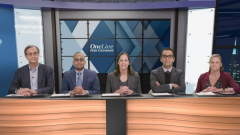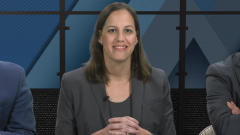
Role of Tucatinib in HER2+ mCRC
Switching their focus to tucatinib, expert panelists review data from the MOUNTAINEER study and define the role of tucatinib in managing HER2+ metastatic colorectal cancer.
Episodes in this series

Transcript:
Kristen K. Ciombor, MD: Continuing in the HER2 [human epidermal growth factor receptor 2]–positive vein, the FDA just gave accelerated approval to tucatinib trastuzumab, which is very exciting, based on the MOUNTAINEER data. Dr Hubbard, walk us through what the MOUNTAINEER study showed and your thoughts on it.
Joleen M. Hubbard, MD: This was a really exciting study we were fortunate to be a part of at Mayo [Clinic]. The MOUNTAINEER study looked at patients who had completed 2 lines of systemic chemotherapy and then their tumors expressed HER2. They were randomized to receive tucatinib plus trastuzumab vs tucatinib alone. In the tucatinib-trastuzumab arm, we saw a fantastic response rate of 38%, which is higher than what had been reported with other HER2-directed therapies, although this was a less heavily pretreated patient population. But still, it’s very exciting to see this degree of response in the third-line setting. In terms of progression-free survival, that was around 8 months, and overall survival [OS] was around 24 months, which is unprecedented for a third-line therapy for metastatic colorectal cancer. The other exciting thing is it’s a pretty well-tolerated regimen. I have a patient who’s been on it for over 2 years and he has absolutely no adverse effects with maybe a little fatigue, but he also says, “I’m getting old.” He can’t decide if it’s the treatment or his age.
Joel R. Hecht, MD: It’s a good thing he’s getting old.
Joleen M. Hubbard, MD: Yes.
Kristen K. Ciombor, MD: Yes, that’s the goal.
Joleen M. Hubbard, MD: It’s pretty well tolerated. A couple of patients have some transaminase elevation. We just dose reduced a little, and the patients did fine continuing on treatment. It does have great activity, but it’s also well tolerated. That’s what I’m most excited for—people are continuing to live their lives 3 to 4 years after a diagnosis of metastatic disease. It’s really exciting.
Joel R. Hecht, MD: They spent a lot of time also in optimizing GI [gastrointestinal] prophylaxis and toxicity. Has that worked out well for your patients?
Joleen M. Hubbard, MD: Yes. Most of my patients actually had very minimal GI toxicity. Tucatinib, as opposed to the trastuzumab pertuzumab, is where we saw a lot more diarrhea. Tucatinib is a more specifically targeted HER2 therapy. It’s supposed to minimize some of the other toxicities we see. That’s definitely the case, at least in my experience with the patients I had on trial.
Kristen K. Ciombor, MD: Do you agree, Dr Kasi? Has that been your experience?
Pashtoon M. Kasi, MD: Yes. As Dr Hubbard said, even though diarrhea is 1 of the most common adverse effects, it’s not anything that requires prophylaxis or too much education, and it’s usually manageable. Transaminitis is something that requires a dose modification but hasn’t needed patients to come off the study [because of] the tolerability, the fact that it’s a pill, the infusion of the trastuzumab every 3 weeks. In terms of a chemotherapy-free regimen in the highly treated patient population, it has an OS of 2 years. The quality-of-life data presented at ESMO [European Society for Medical Oncology Congress] pretty much showed preservation, which we often don’t see with a lot of other therapies if there are cumulative issues or is a decline in quality of life despite efficacy. From a patient standpoint, they’re getting an efficacious regimen without compromising on quality of life or other variables.
Kristen K. Ciombor, MD: That’s great. We’re very excited about that, and I’m curious how all these therapies will be sequenced. We have more work to do to figure out the optimal way.
Joleen M. Hubbard, MD: I should put in a plug for the MOUNTAINEER-03 study because [investigators are] looking at moving tucatinib plus trastuzumab with chemotherapy in the first-line setting. This highlights the importance of the testing phase right away, so we can put patients on these trials. [We want to] see if we move the HER2 therapy up front to the first-line, are we going to improve outcomes even more?
Joel R. Hecht, MD: Are you allowing the first cycle off?
Joleen M. Hubbard, MD: Unfortunately, no. It’s not allowed. That’s something the company has heard repeatedly from us investigators, both for this study as well as the BREAKWATER study, which we’ll talk about. It’s very difficult to enroll if you’re a patient, as you can imagine.
Joel R. Hecht, MD: It goes back to what we were saying earlier about time lag before we get these results back. Actually, in upper GI, the bemarituzumab trials were smart. More studies are allowing for at least a cycle or 2, which probably doesn’t make any difference in the first line. I could see that that would be a problem. Your coordinators have to be on the ball to get tissue from wherever they found it.
Joleen M. Hubbard, MD: Yes. A poster was presented looking at patients who didn’t have biologic therapy. It wasn’t for HER2-directed therapy, but it highlights the point that it’s probably not going to make a huge difference if they don’t have that biologic in the first cycle.
Pashtoon M. Kasi, MD: The other thing to think about, because it would probably lead to permeation of HER2 testing earlier, is that it’s not just about pairing with the HER2-directed therapy. Dr [Kanwal Pratap Singh] Raghav and his group have shown that it’s also a negative predictive marker of anti-EGFR utility. As we think about the rise of young-onset colorectal cancer that is HER2+.
Joel R. Hecht, MD: Oh, I agree. I wouldn’t put someone on it who’s HER2+. That would change what I would do. I agree 100%.
Pashtoon M. Kasi, MD: And you could look at the IHC [immunohistochemistry], so that’s a huge advantage as a biomarker. You’re not necessarily waiting for genomic testing to come back. Even though you can detect the ERBB2 amplification, an IHC paired with reflexive MMR [mismatch repair] is probably the ideal platform for getting the results back quickly.
Joel R. Hecht, MD: But we did that to detect Lynch syndrome in patients with stage II colon cancer. It’s hard. The question is, who’s going to pay for it in patients who may never be metastatic up front? Do we just have to be faster? That’s a tough thing. How many days do you have before you start therapy? Are you able to wait for something like this?
Joleen M. Hubbard, MD: Exactly.
Joel R. Hecht, MD: It’s becoming hard. In practice, you’re right. Let’s say this becomes the standard of care. They’ll say, “I’ll wait,” or “I’ll give them something else up front and then change it when it comes through.” But for trials, it’s becoming harder and harder.
Kristen K. Ciombor, MD: Yes.
Joleen M. Hubbard, MD: It’s interesting because it’s not the companies or the sponsors of the trial. It’s the FDA that’s saying, “You need to start it first line.” We need to work with our patient advocates and try to get this changed to have more feasible clinical trials.
Pashtoon M. Kasi, MD: We also have to think about how these data would be applied globally. In places where all this is coming out of pocket, you may not be able to do universal NGS [next-generation sequencing] testing or all kinds of IHCs reflexively. To the point on the MOUNTAINEER study and also other HER2-directed trials, 80% to 90% of the cohorts were rectal or left-sided. For that particular patient, who has a rectal or left-sided tumor, you could enrich for higher numbers in that cohort and wait for the results to come back, especially in areas where it’s coming out of pocket for the testing.
Transcript edited for clarity.









































